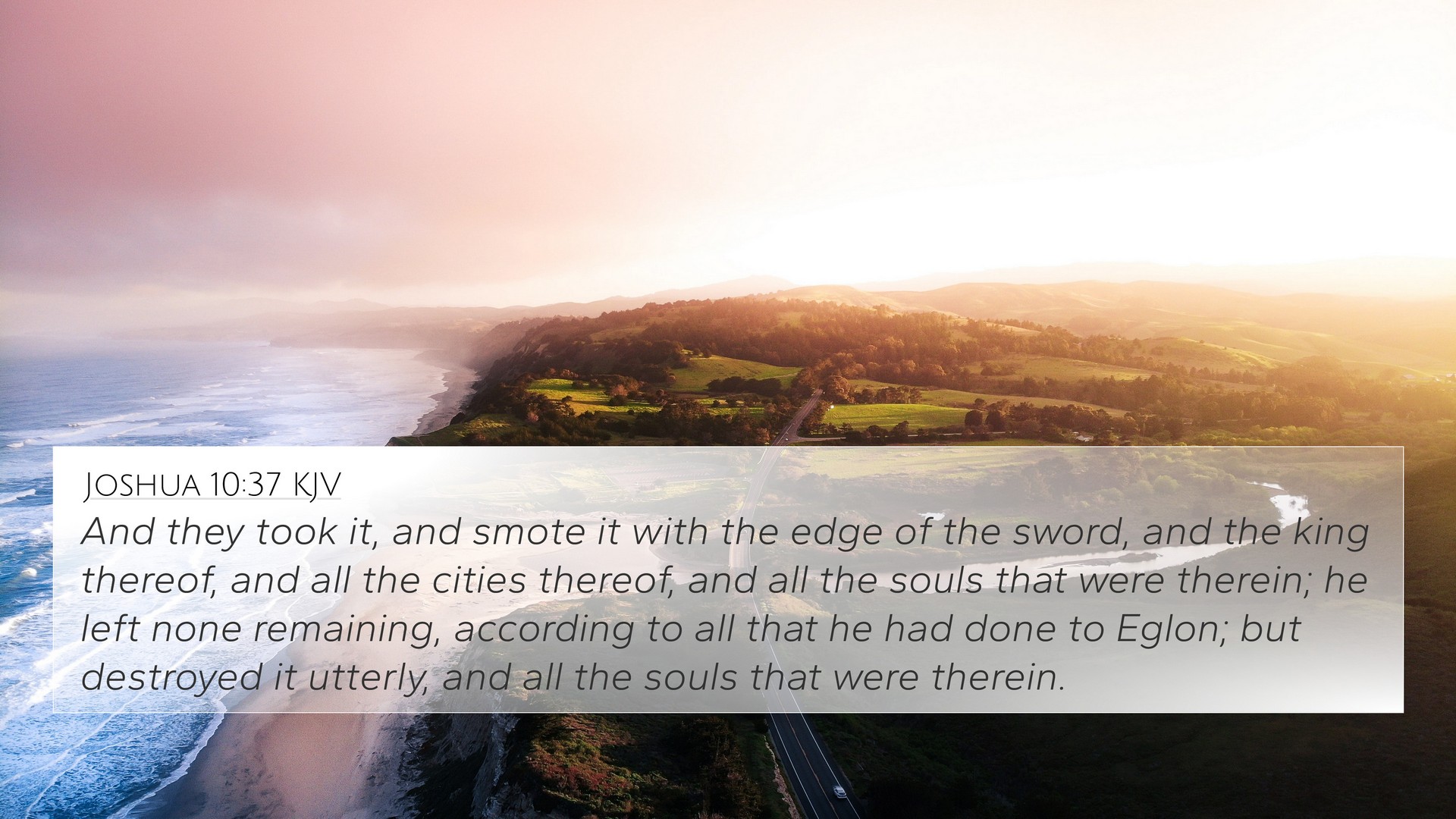Understanding Joshua 10:37
Joshua 10:37 states: "And they took it, and smote it with the edge of the sword, and the king thereof they killed, and all the cities thereof; and all the souls that were therein he utterly destroyed. He left none remaining; as he had done to Hebron." This verse captures a decisive moment in the conquest of Canaan, illustrating God's judgment through Israel against the Amorite cities.
Summary of Insights from Public Domain Commentaries
In examining this verse, various commentaries offer valuable insights:
-
Matthew Henry:
Henry emphasizes the totality of destruction as an act of divine judgment. He notes that the Israelites were fulfilling God's command to eradicate the sinfulness of these nations, which had reached a point where such measures were necessary. He points out that this act signifies the seriousness of sin and its ultimate consequences.
-
Albert Barnes:
Barnes elaborates on the historical context, indicating that the aforementioned cities were strategically important for the Amorites. Their defeat highlights the power of God working through Israel. Barnes also suggests that the swift and complete destruction serves as a warning against the arrogance of enemies of God's people.
-
Adam Clarke:
Clarke provides a theological perspective that connects this act of destruction with God's covenant with Israel. He points out that such divine intervention was necessary to establish Israel as God's chosen people in the Promised Land, reaffirming the importance of obedience to divine commandments amidst conflict.
Thematic Connections
This verse has rich thematic connections within the Bible:
- Divine Judgment: Reflects God's righteous judgment on nations engaging in sin.
- Covenant Promises: Demonstrates the fulfillment of God's promises to deliver the land to Israel.
- Obedience and Warfare: Illustrates the necessity of obedience in Holy War as a means of executing God's will.
Bible Cross-References
Joshua 10:37 can be understood more fully through various cross-references:
- Deuteronomy 7:2: God's command to destroy the nations.
- 1 Samuel 15:3: The command to utterly destroy the Amalekites.
- Numbers 33:52: Instructions to dispossess the inhabitants of the land.
- Joshua 11:12: Summary of the conquest of the northern kings.
- Jeremiah 49:18: Prophecy of destruction upon Edom.
- Revelation 19:11-21: Imagery of divine judgment in the end times.
- Psalms 2:9: The authority of God to crush the nations.
Connections Between Bible Verses
The process of linking Bible scriptures enhances understanding:
- Analyze how Joshua 10:37 relates to the broader narrative of conquest in Joshua 1-12.
- Identify parallels with Romans 1:18-32 where divine wrath against unrighteousness is discussed.
- Comparative study with Genesis 15:16 regarding the iniquity of the Amorites.
- Explore Hebrews 11:30-31 which conveys faith leading to victory over cities.
Tools for Bible Cross-Referencing
Utilizing Bible reference resources can enhance study:
- Bible Concordance: A tool for finding keywords and their occurrences.
- Bible Cross-Reference Guide: Provides insights into related verses.
- Cross-Reference Bible Study: Effectively combines verses for thematic exploration.
- How to Use Bible Cross-References: Techniques for identifying connections.
Conclusion
Joshua 10:37 provides significant theological insights and connects with broader Biblical themes, serving as a powerful reminder of God's justice and the seriousness of sin. Through the practice of cross-referencing, believers can gain deeper understanding and contextual background for their study of the Scriptures.


